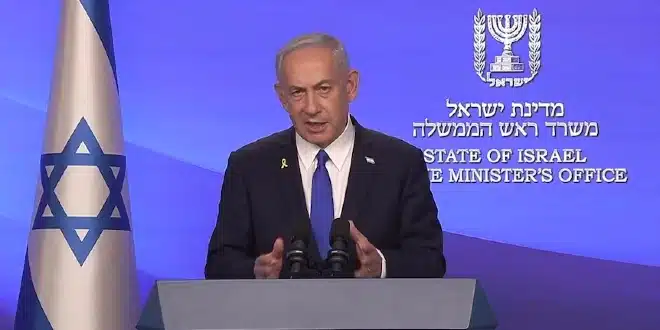Israeli Prime Minister Benjamin Netanyahu has declared that Israel is locked in what he described as a “critical battle,” framing the confrontation as part of a larger struggle against the so-called “Iranian axis.” In a New Year address to mark Rosh Hashanah, Netanyahu said that dismantling this alliance was “within Israel’s capabilities” and could lay the groundwork for a more secure region in the years ahead. He suggested that the coming year may prove to be “historic” for Israel’s national security.
His remarks come at a tense moment in the region, as Israel continues its offensive in Gaza and speculation grows about potential future strikes on Iran. Only a few months earlier, Israel carried out Operation Rising Lion, a major attack inside Tehran targeting military and nuclear facilities. The operation escalated into what former U.S. President Donald Trump later described as the “twelve-day war,” marked by Iranian retaliation and U.S. intervention that eventually forced an uneasy halt.
Netanyahu praised the Israeli Occupation Forces (IOF) for their “heroism” and “sacrifices” during ongoing operations, stressing that the campaign against Hamas remains focused on destroying the militant group, securing the release of hostages, and preventing future threats from Gaza. But he also made clear that these were not the army’s only objectives. Emphasizing the importance of national unity, he urged Israelis to show “determination in every moment” and “solidarity in times of crisis.” He closed his address with the words: “May we have a year of security, victory, and unity. Happy New Year.”
Israel has also confirmed it will not attend Tuesday’s emergency United Nations Security Council meeting on Gaza, citing the overlap with the Jewish New Year.
Growing Momentum for Palestinian State Recognition
Netanyahu’s speech coincided with a significant shift on the international stage. British Prime Minister Keir Starmer announced that the United Kingdom has formally recognized the State of Palestine, joining a growing bloc of Western nations breaking with long-standing policy. Canada became the first G7 country to do so, citing its enduring commitment to a two-state solution. Australia and Portugal quickly followed suit, while France, Malta, and New Zealand signaled they are preparing to take similar steps during the ongoing United Nations General Assembly (UNGA) in New York.
The recognition wave has been welcomed by both the Palestinian Authority and Hamas, who view it as a major diplomatic victory after decades of international stalemate. However, reactions elsewhere have been sharply divided. The United States dismissed the move as “performative,” while Israel denounced it as a “one-sided” action that undermines peace efforts and rewards terrorism.
The decision by multiple Western allies to move ahead with recognition adds fresh pressure on Israel, already facing widespread criticism over its military campaign in Gaza. The war, now approaching its two-year mark, has killed more than 65,000 Palestinians, the majority civilians, according to figures from Gaza’s Hamas-run health ministry that the UN has deemed credible. Israel, meanwhile, cites the October 7, 2023 Hamas attacks that left 1,219 Israelis dead as justification for its ongoing campaign.
What This Means Going Forward
Netanyahu’s hardline stance, combined with the international push for Palestinian statehood, sets the stage for intensified diplomatic clashes in the months ahead. With more than 140 world leaders gathering for the UNGA this week, the question of Palestinian recognition is expected to dominate speeches and debates.
While Israel continues to emphasize military strength and regional security, the growing list of countries recognizing Palestine underscores a deepening divide between Israel and some of its closest Western allies. For many diplomats, the current moment represents both a turning point in the conflict and a test of whether the long-discussed two-state solution can be revived—or whether the region will remain locked in cycles of violence and diplomatic isolation.


